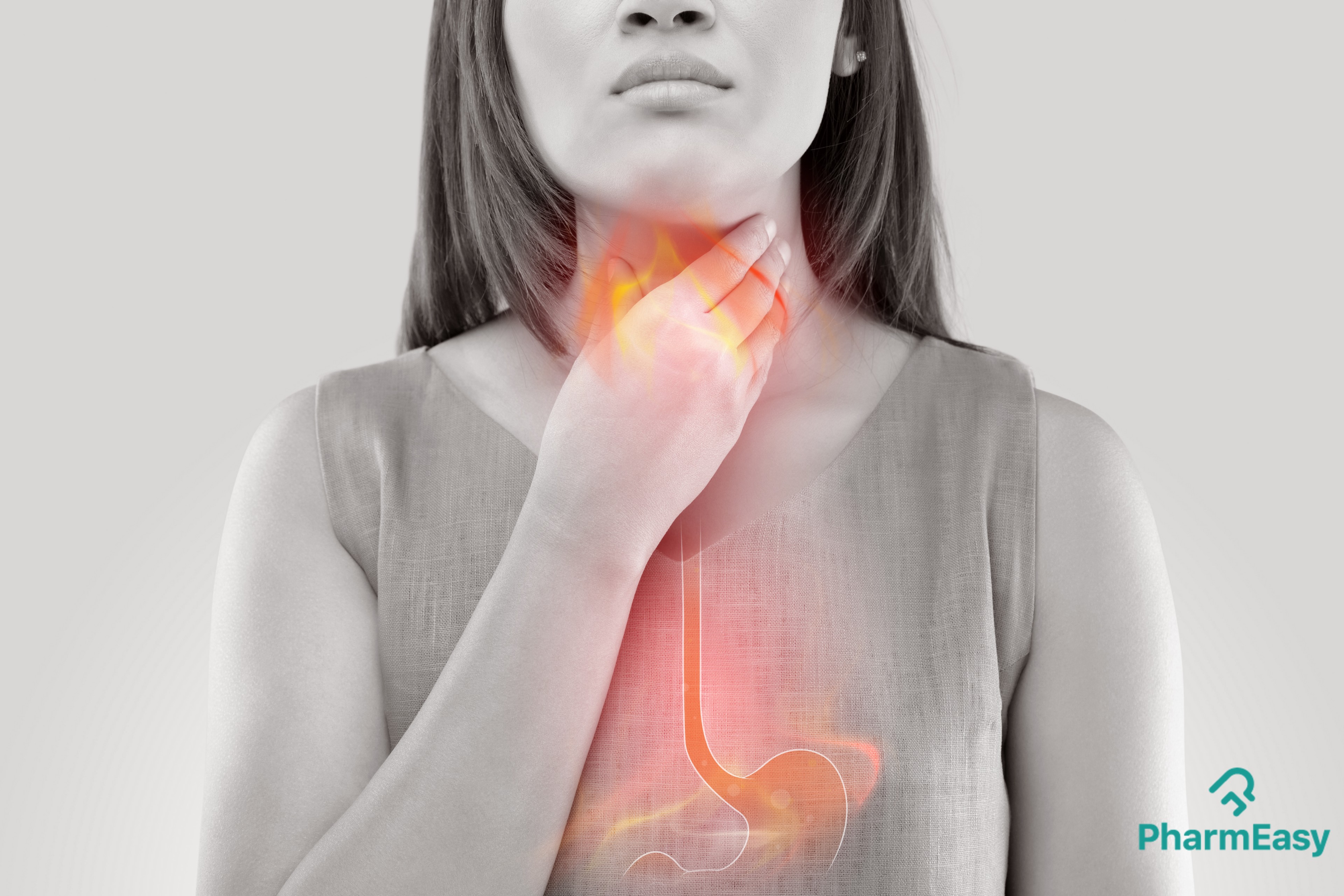How to Fight Gastroesophageal Reflux Disease?
By Riddhi Parmar +2 more

Download PharmEasy App




Register to Avail the Offer
Send OTPBy continuing, you agree with our Privacy Policy and Terms and Conditions
By Riddhi Parmar +2 more
Are you having a recurrent heartburn? If yes, then probably you should see your doctor as you may suffering from gastroesophageal reflux disease also known as GERD.
Gastroesophageal refers to the stomach and esophagus. Reflux means to flow back or return. Therefore, gastroesophageal reflux is the return of the stomach contents back up into the esophagus. GERD affects people of all ages – from infants to older adults.

Table of Contents
It is a digestive disorder that occurs when stomach acid frequently flows back into the esophagus. This backflow (acid reflux) can irritate the lining of the esophagus. GERD occurs when the lower end of the esophagus become weak and not able to open or close properly.
It is a chronic condition where you can have complaints more than twice a week. It is a quite common problem among the urban population due to a sedentary lifestyle, overeating, etc. Here are some causes of GERD –
Some conditions that increase your risk of GERD are as follows –
Most of the signs and symptoms worst during the night while lying down and less in the day time. If you have persistent heartburn for a longer time then you must visit your doctor.
Your doctor may perform a test to confirm your diagnosis of GERD which can measure the acid content of your esophagus. Also, he/she may examine your esophagus for damage to measure muscle contractions in your esophagus or look at your entire upper digestive tract. Do not self-diagnose or take medications without proper consultation.
Heartburn or GERD symptoms can last around 2-4 hours until the food leaves your stomach and goes into your small intestine. Even after that point, you can have symptoms return later on. This could go on and repeat for days or weeks if left untreated. Some people’s symptoms may disappear within a few weeks with lifestyle changes and over-the-counter medications, for some it may worsen as the disease progresses.
Dr. Ashish Bajaj – M.B.B.S, M.D.
The first step to treat this disease to change your lifestyle such as changing what you eat or drink. If the complaints persist then your doctor may advise you some medicines such as proton pump inhibitor or histamine – 2 blockers. In the extreme case, the doctor might opt for surgery.
The following lifestyle changes can ease your symptoms:
Also including certain food in the everyday diet helps in treating GERD:
Lifestyle changes is very effective in GERD. Weight loss and tobacco smoking cessation should be recommended to GERD patients who are obese and smoke, respectively. Avoiding late evening meals and head of the bed elevation is effective in nocturnal GERD.
Dr. M.G. Kartheeka, MBBS, MD
Damage to the lower esophagus from stomach acid causes scar formation. The scar tissue narrows the food pathway, leading to problems with swallowing.
Damage from acid can cause changes in the tissue lining the lower esophagus. These changes are associated with an increased risk of esophageal cancer.
The actual reason is unknown to understand how and why asthma is aggravated by GERD. Maybe due to recurrent irritation of lung nerves, asthma may induce.
Also Read: 5 Instant Home Remedies For Gastric ProblemStomach acid can cause an injury to tissues in the esophagus, causing an open sore to form. An esophageal ulcer can bleed, cause pain, and make swallowing difficult.
The reflux of liquid into the lungs (called aspiration) often results in coughing and choking. Aspiration, however, also can occur without producing symptoms. With or without these symptoms, aspiration may lead to infection of the lungs and result in pneumonia.
Also Read: Why Is My Upper Stomach Bigger Than My Lower? Understanding Body CompositionIt is a chronic and sometimes life-long health condition to deal with. Early diagnosis and proper treatment can control or cure your symptoms. Left untreated, however, GERD can cause permanent damage to the esophagus.
Nice article…very helpful
Comments